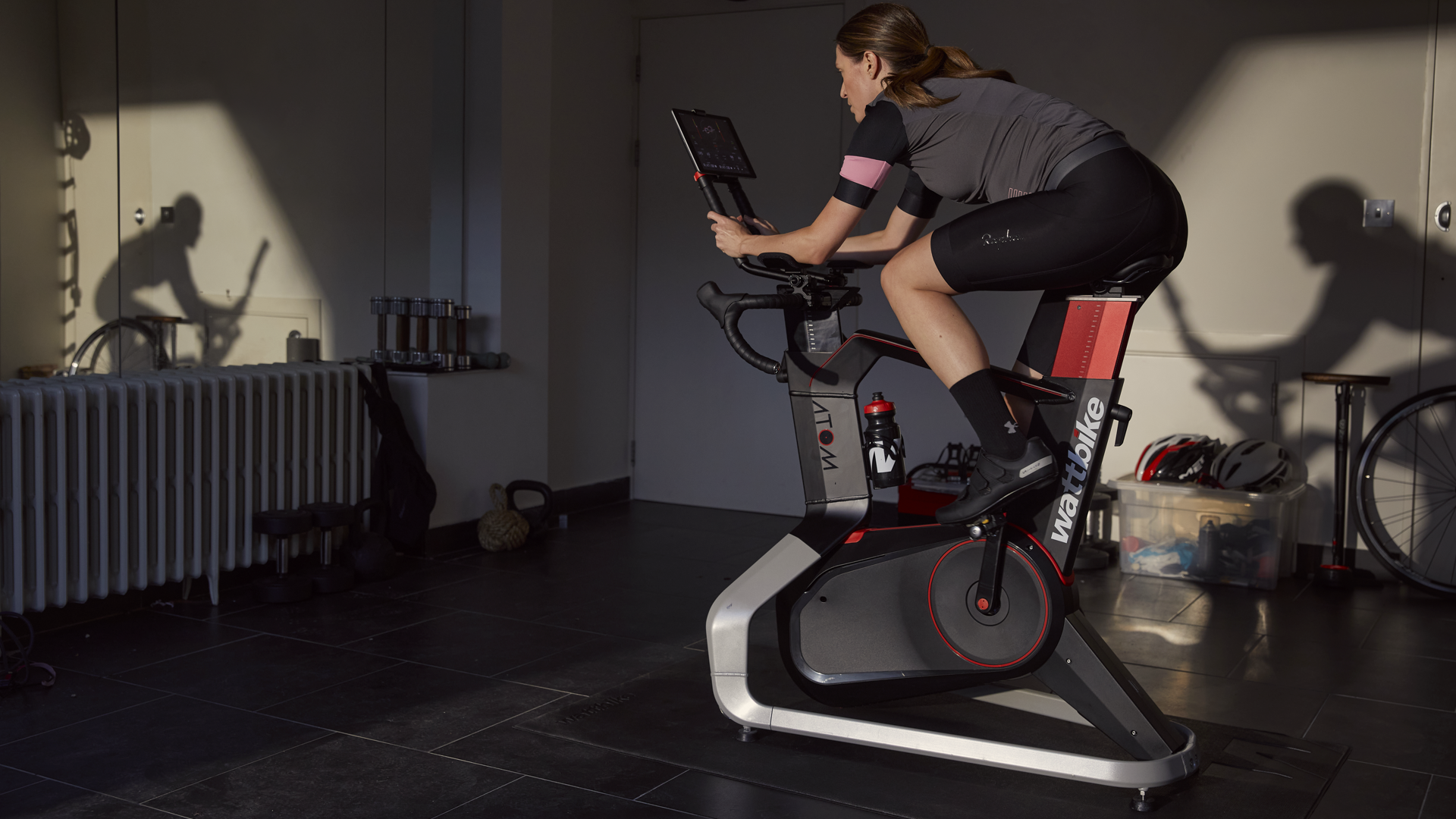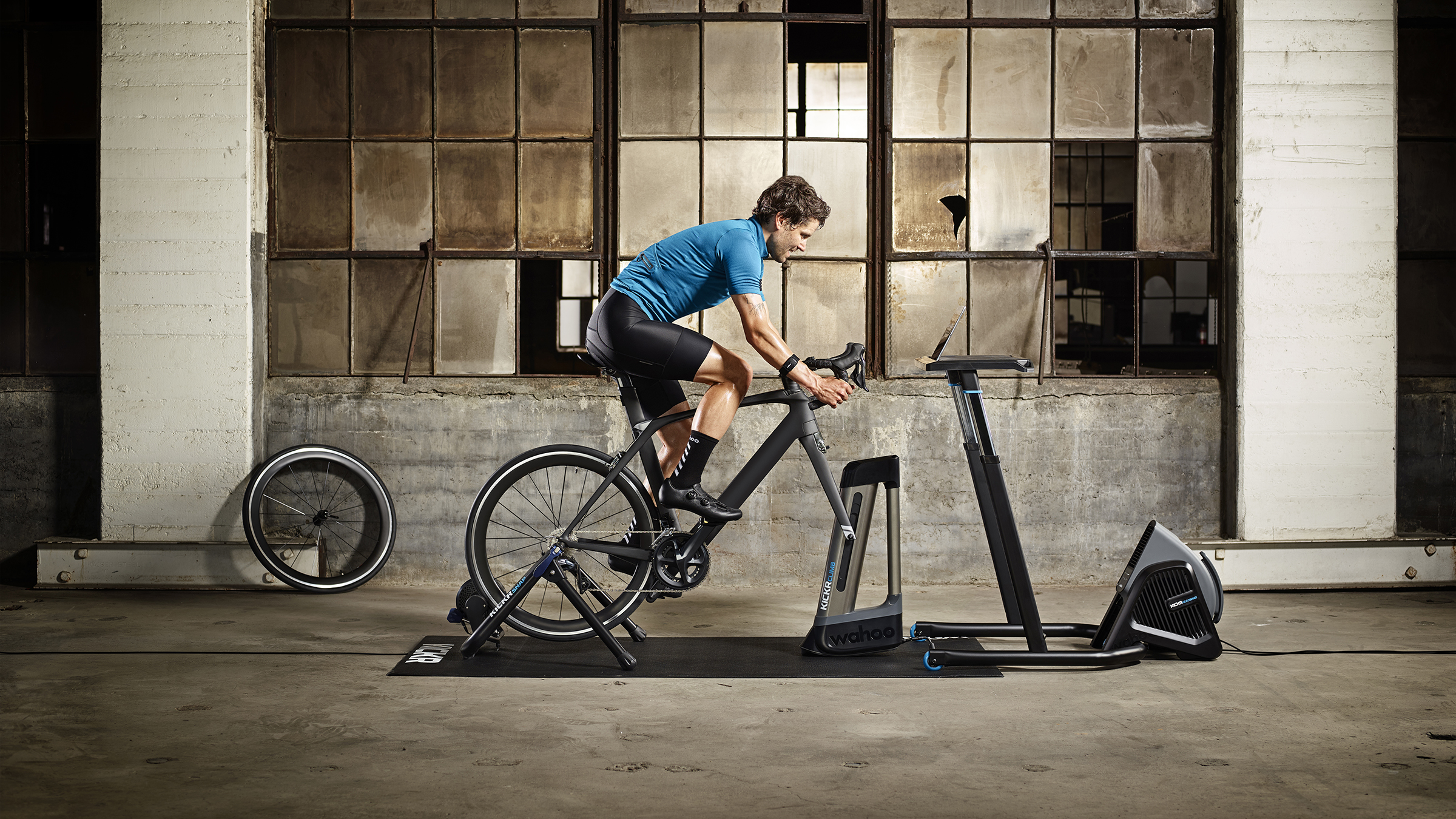
Indoor cycling for fitness is an idea whose time has come. That's why we've put together this handy guide to getting fit at home via gamified pedal power.
Keeping fit while also juggling a busy job, social life and family commitments is tough even for the most dedicated athletes, and even at the best of times. Staying in shape when there's a lockdown on, gyms are shut and the weather is decidedly on the cold side? Not that is really hard.
However, staying in shape doesn't necessarily need gyms, or even the outdoors – although the promise of being able to go outside again, with a new and improved body and better health, is certainly good motivation.
- The best Zwift setup for every budget
- HIIT: how to torch fat fast with High Intensity Interval Training
- Uphill cycling tips from 'Everesting' world record holder
Want to get fit at home? Get on your bike!
If you want to ride indoors, you have two options: go to the gym or create your own indoor cycling setup at home. Given that in 2021 going to the gym is not so popular or even possible in some places, we think you'll find option 2 is more to your liking, sir or madam.
For indoor cycling fitness training at home you’ll either need a turbo trainer – which turns your regular bicycle into an indoor trainer – or a dedicated indoor training bike such as the next generation Wattbike Atom from our pals at Wattbike, now from just £45 per month!

The next generation Wattbike Atom is a more compact version of the Wattbike Pro Trainer found in gyms around the world
Tech-savvy training
Smart bikes such as the aforementioned next-gen Wattbike Atom can be used with Zwift and other training apps. It's no exaggeration to say that Zwift, TrainerRoad, Sufferfest and the rest have revolutionised indoor training.
Zwift offers virtual worlds in which you can ride with and against thousands of other cyclists. You can join group rides and races, embark on a dedicated training plan, or take your pick from a wide range of structured training sessions. It’s now available for treadmill-owning runners, too
Get all the latest news, reviews, deals and buying guides on gorgeous tech, home and active products from the T3 experts
If you’re short on time and have the right kind of smart trainer bike, indoor cycling apps will ensure you get the most from every session. Efficiency is the name of the game if you have limited time but want to make big gains, and the latest apps use your power data to target specific areas of fitness.
All the apps we've mentioned require a monthly or annual subscription but there are plenty of free options – Wattbike Hub, for instance.

You can use Zwift with rollers and an iPad or a static smart bike and a 4K TV, depending on your space and budget
5 Indoor training mistakes to avoid
Get the most out of your indoor training regime by avoiding these five common mistakes
It’s no secret indoor training is one of the most effective ways to make big performance gains, especially over the cold winter months where riding outdoors is dangerous and miserable option.
While the advent of training apps such as Zwift has made the indoor training concept a little more easier to bear, few of us truly look forward to these rides despite the immersive experience. Time on the stationary trainer can be a whole lot more comfortable and effective by implementing a few strategic and often-overlooked measures.
Here are five of the most common pitfalls often associated with indoor training and how to avoid them.
1. Don’t forget the fan. When we cycle at higher intensities the body generates more heat which can result in reduced performance if left unchecked. Using a fan during indoor cycling increases convective heat loss, allowing you to produce a higher power output which will stimulate greater training adaptions during high intensity interval training.
2. Don’t hammer it from the gun. Going too hard too quickly is one of the biggest mistakes you can make during an indoor session. Easing into the ride or workout allows the body to prepare itself for harder efforts. The same goes for the cool down – a 15 minute soft pedal will slow such functions as sweat rate and heart rate.
3. Don’t ride every session indoors. Sure, riding in a controlled environment has its merits but spending too much time focusing on the numbers and not your skills can be detrimental come race day. Then there are the external factors such as wind, rain and heat, each of which have a direct bearing on real-world performance. Try to mix things up when you can.
4. Don’t ignore structured training. It’s important to stay disciplined as this is where the gains are made. Riding indoors can often lead to a lapse in concentration – either by way of boredom or the complete opposite when using applications such as Zwift – which influences the quality of the session.
5. Don’t forget to fuel. Training indoors often yields a higher sweat rate than riding outside. This accelerates the risk of dehydration and glycogen depletion which ultimately leads to the dreaded bonk. Depending on the length of the workout it’s important to eat something 90-120 minutes before you begin and remember to top up throughout the session by sipping water or consuming carb-based energy gels.
Indoor cycle training: what the experts say
If you’re pressed for time, indoor cycling offers a quick-fire workout for your legs, lungs and heart, helping you to get fit fast and keeping you trim in the process. In fact, cycle training indoors is one of the most efficient forms of training, according to James Spragg of Spragg Cycle Training.
“It’s so quick to do,” says Spragg, a former professional cyclist turned coach. “You can jump on and do a high-intensity session in ten minutes and get a benefit.”
“Anyone who wants to get fit can benefit from indoor riding, it’s not just for dedicated cyclists,” adds Ian Jenner of Rule 5 Cycling Coaching.
“One of the big issues with going to the gym is getting yourself organised. You have to travel somewhere else, take your kit bag and so on. With indoor training, you can setup your bike at home, then all you have to do is put your shorts on and away you go.
“If you can limit the excuses as to why you can't do a session then you have more chance of doing it. And now, with so many training apps available, you can even workout with other people.”
“Zwift’s workout mode puts everything on the screen in front of you,” says Jenner. “You can see the structure of the workout, the power values you need to hit and the duration of each interval. If you’re using a smart trainer, it will set the resistance for you, too. Targeted training is easily within reach.”
That means you don’t have to be a sports scientist or data-obsessed number cruncher to feel the benefits of indoor training, nor do you have to dedicate time that you simply don’t have. The key, however, is consistency.
Keep it consistent
“Consistency beats everything else in training,” says Spragg, “so even a ten-minute HIIT (High-Intensity Interval Training) session once a day is likely to be more beneficial that one 70-minute bike ride at the weekend.”
Training at home enables you to squeeze your sessions into a busy schedule, whether that’s before work, while the dinner is in the oven or after putting the kids to bed. Being able to hop on the indoor trainer means you can squeeze an intense session into a short amount of time.
“It’s a huge time saver and there’s no worrying about cleaning your bike after,” says Pav Bryan of Spokes Personal Performance Coaching. “You can have your shorts ready and just jump on the trainer.”

The Wahoo Kickr is an example of a smart turbo trainer
The goal is to make training a habit rather than a chore to put off, adds Jenner, and the efficiency of indoor training means you can build sessions into your day-to-day life. You’ll quickly feel the benefits, he says.
“Being able to ride indoors when you can't get out helps keep you in a training rhythm and get you into the habit of exercise,” says Jenner.
“There are so many benefits to doing short intense efforts, from burning a lot of calories in a short space of time to improving oxygen consumption, reducing heart rate and lowering blood pressure. It’s not all about spending hours and hours training to improve your fitness.”
• This article is part of a series on indoor cycling, supported by Wattbike